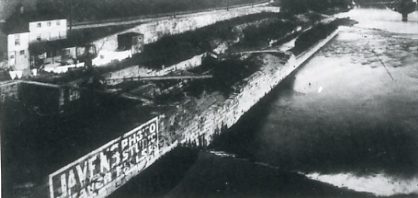
Girard Lock picture courtesy of Harold Boyer.
Click Here to Return to Milestones

Many Beaver Countians at one time or another
have either heard of, or at least seen old pictures of Girard
Locks. Even fewer know that they were once located on the eastern
shore of the Beaver River near Rochester, and were a part of the
Beaver Division of the Pennsylvania Canal that stretched from
the mouth of the Beaver River all of the way to New Castle. Although
Girard Locks have a place in the history of Beaver County's canals,
almost none of us know the story of Stephen Girard, the extraordinary
Philadelphian for whom they were named.
Stephen Girard was born in Bordeaux, France in 1750, the son of
a French naval officer. Born with a disfigured right eye, he faced
ridicule and social stigma throughout his early life. Overcoming
his problem, Girard went to sea at the age of fourteen as a cabin
boy on a merchant ship, and began his rapid rise through the ranks
to captain at the age of twenty-three. On a voyage from Martinique
in 1776, Girard encountered rough seas and sought shelter in the
Delaware River at the port of Philadelphia, where he would make
his home. It was here that he began to build a shipping empire
that would encompass the world and eventually make him the richest
man in America. A true story of rags to riches.
In addition to his interests as a merchant shipper, Girard also
went into banking and became the most successful banker in American
history. During the War of 1812, when the federal government was
having trouble raising funds to finance the war, Girard put together
a private syndicate to sell bonds and find investors to bail out
the government. When this effort fell short of raising the necessary
money, Girard risked his entire fortune when he made a personal
loan of nearly $8 million to fund the war effort while demanding
nothing in return.
Stephen Girard also had another side to his character. During
a Yellow Fever epidemic in 1793, Girard, who could have fled Philadelphia
along with all of the other notable and wealthy people, remained
to care for the sick and the dying. He supervised the work of
volunteers in transforming a mansion just outside the city limits
into a hospital. Girard personally handled many of the menial
tasks associated with nursing the living and burying the dead.
Through his efforts, those infected with the disease, in the care
of Girard and his staff, gained a fair chance of survival. Those
who died were given a proper burial.
Stephen Girard died at his Philadelphia home in December, 1831.
Girard's most lasting legacy was his final will and testament,
which can only be described as a remarkable document written by
a remarkable man. Although he provided for family members, the
bulk of his wealth was given out to fund social projects to help
the poor and unfortunate, such as the establishment of Girard
College (which still exists today) to educate poor orphan boys.
However, for Beaver County, his most interesting legacy came as
a donation of $300,000 to the State of Pennsylvania to fund transportation
improvements. The state used the money to help build the Beaver
Division of the Pennsylvania canal, and the first lock was named
in his honor. Although Stephen Girard never lived in or even visited
Beaver County, we help to honor his memory each time that we mention
Girard Locks.